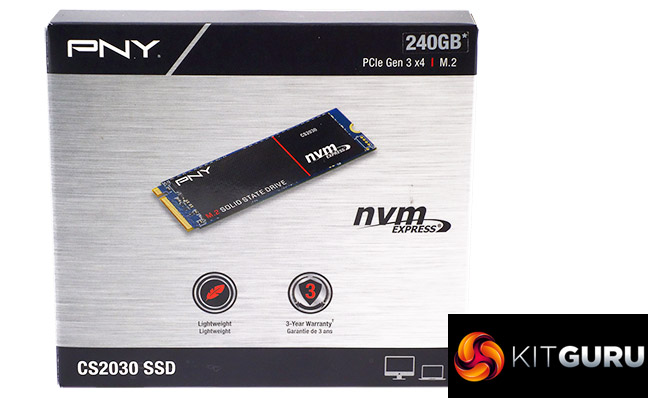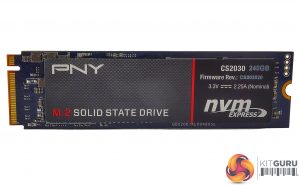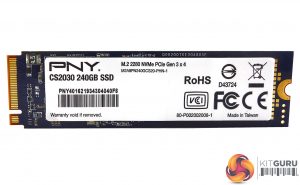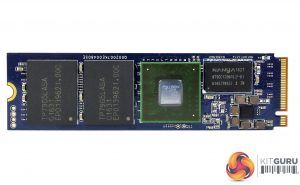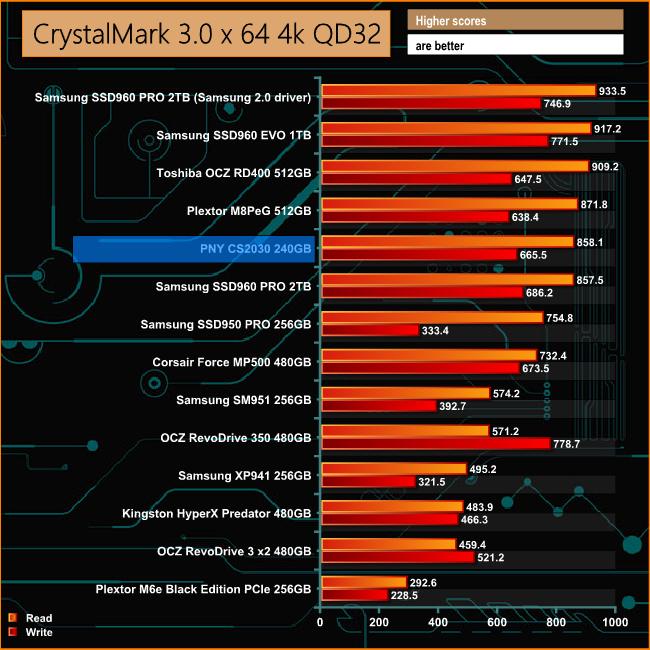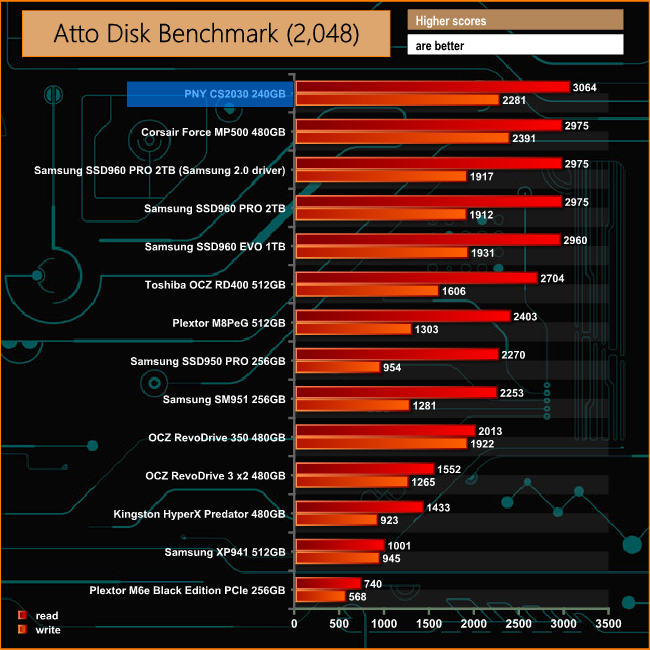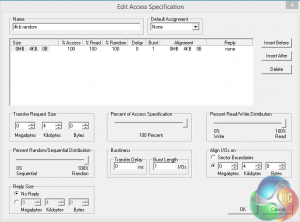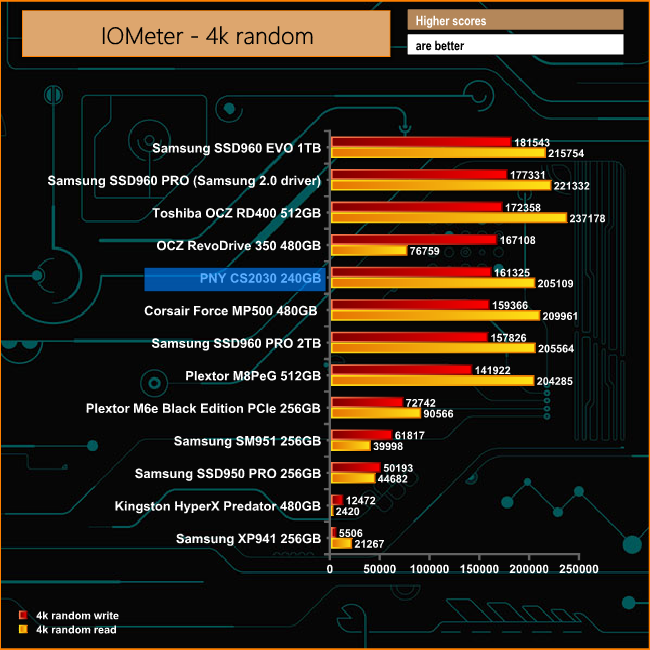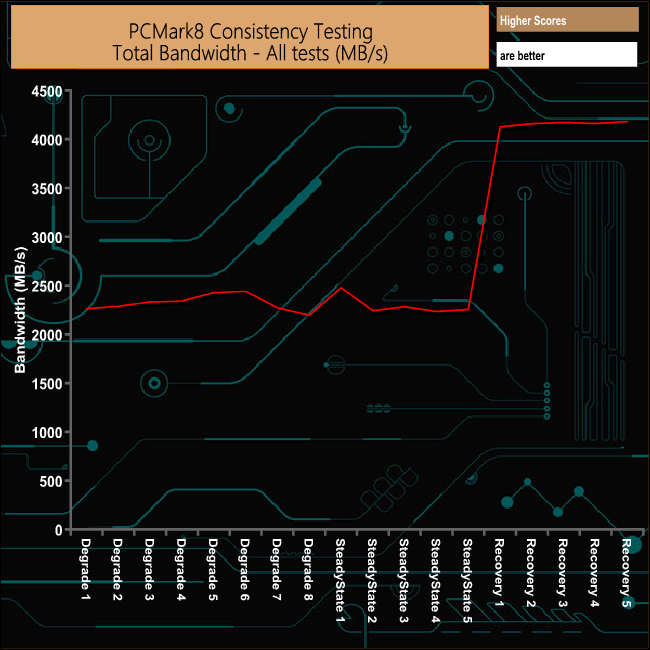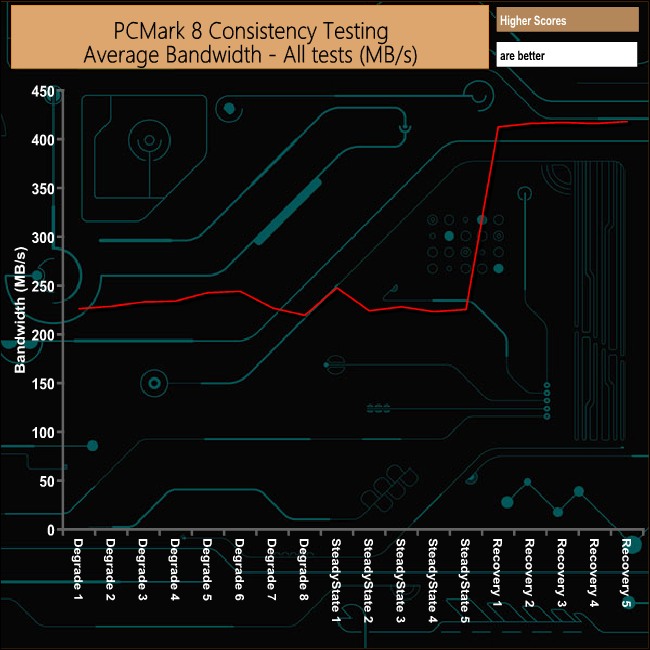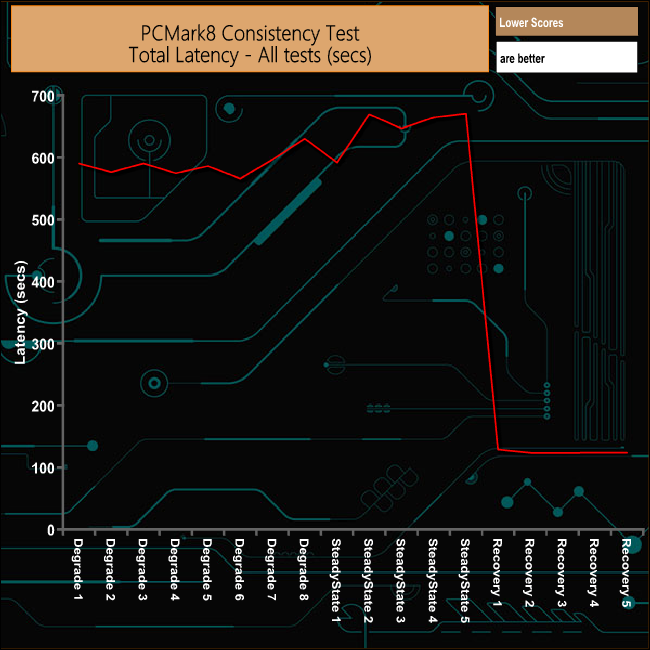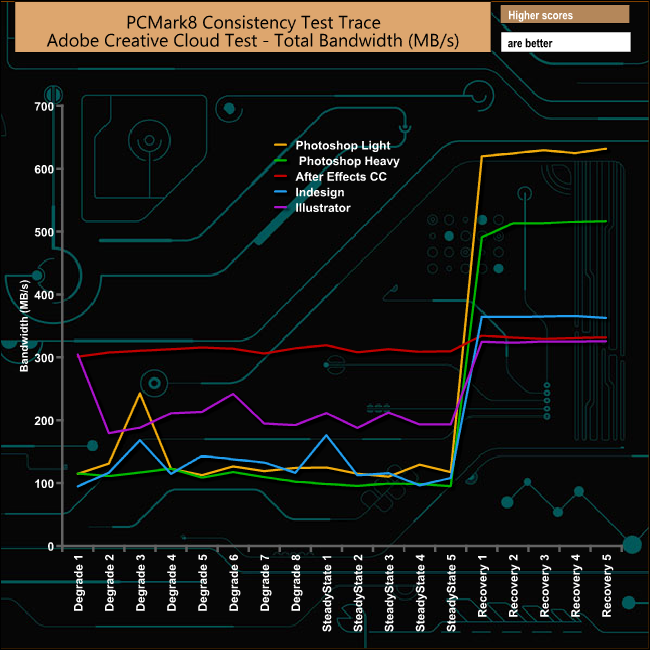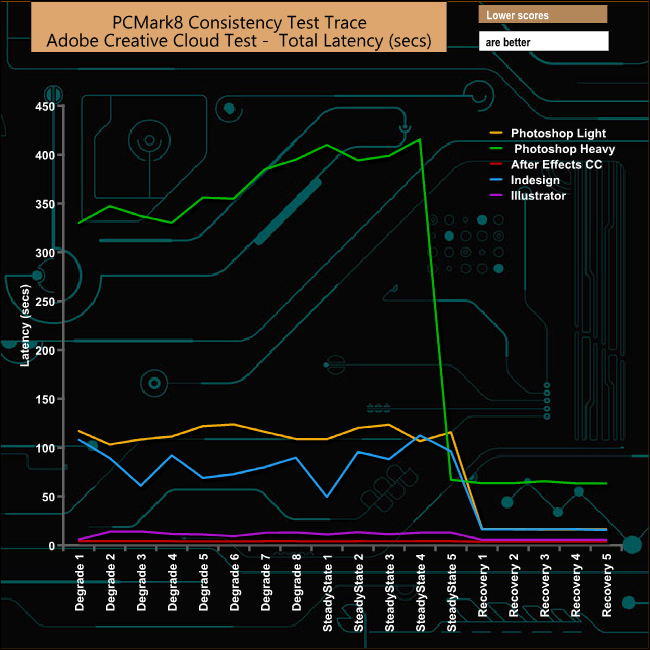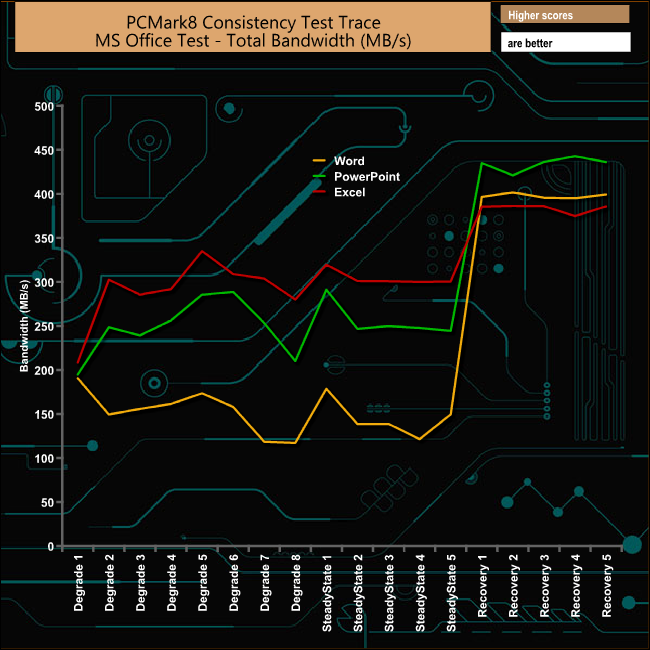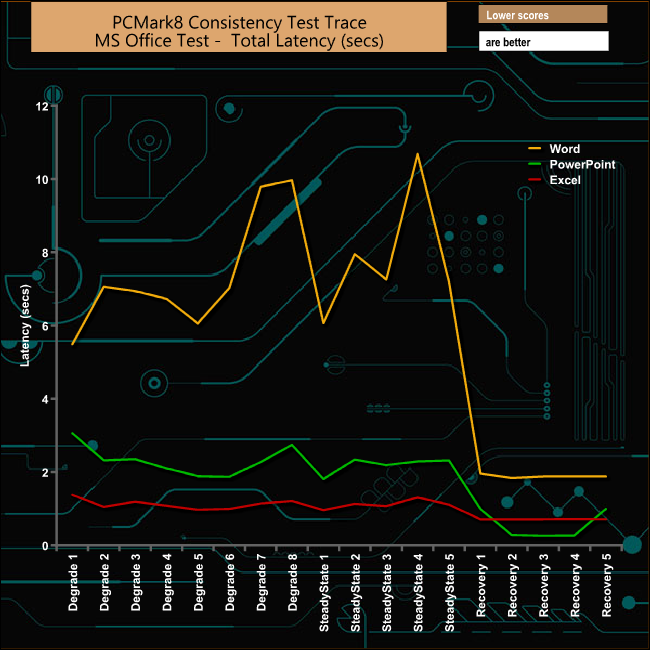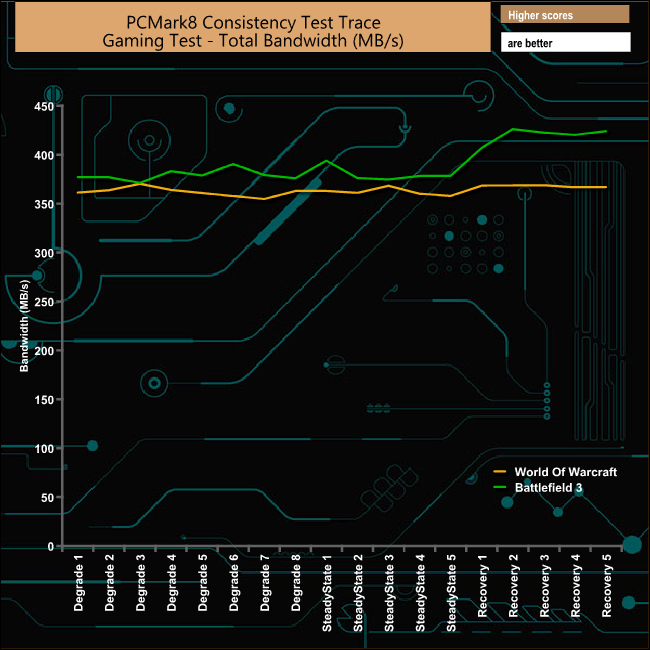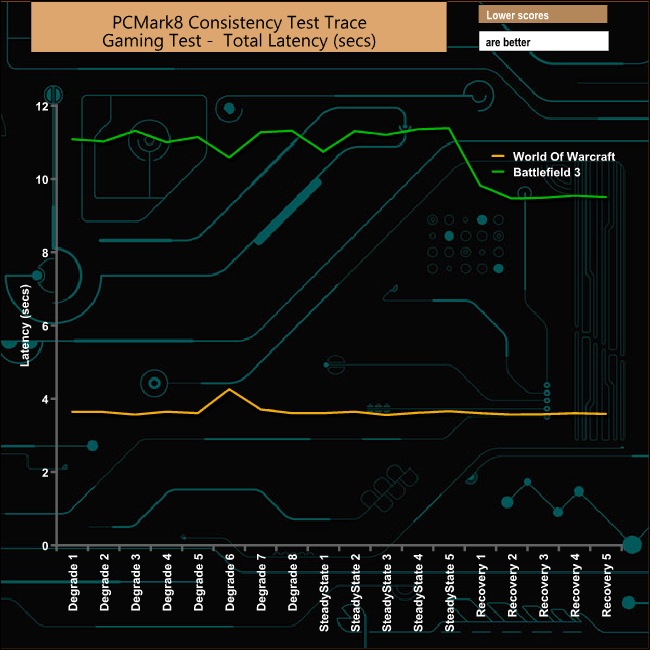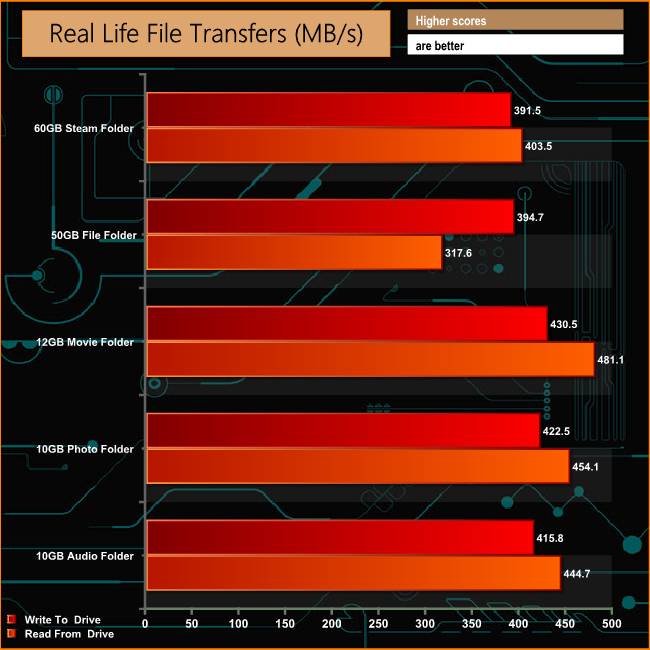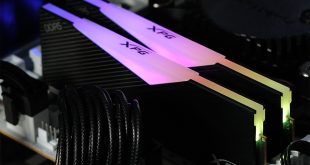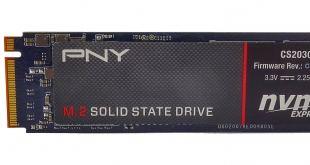
Many people missed the release of the new PNY CS2030. PNY seemed almost to avoid marketing the drive with tech media which is surprising considering it is their first consumer PCIe NVMe M.2 drive. We find out today how it handles and if it is worth considering for a new system build.
Built on an M.2 2280 form factor with a PCIe Gen3.0 x4 interface, the PNY NVMe CS2030 uses a combination of a Phison E7 controller and Toshiba 15mn MLC NAND. At the time of writing, there are just two capacities available, 240GB and 480GB.
Quoted Sequential performance figures for the 240GB drive are 2,750MB/s for reads and 1,500MB/s for writes. 4K random read/write figures are 201,000 IOPS and 215,000 IOPS respectively. The 480GB model is a little faster at 2,800MB/s and 1,550MB/s respectively for Sequential read/writes while random read/writes come in at 300,000 IOPS and 215,000 IOPS respectively.
Although there's is no mention of encryption support in the specification sheet for the drive, AES-256 encryption is part of the Phison controllers feature list. Similarly, there's no mention as to what the endurance rating of the drive is, but PNY back the drive with a 3 year warranty.
Physical Specifications:
Usable Capacities: 240GB, 480GB
NAND Components: Toshiba 15mn MLC
Interface: PCIe Gen3.0 x4 NVMe
Form Factor: M.2 2280
NAND Controller: PS5007-E7
Dimensions: 80 x 22 x 3.8mm
Drive Weight: 8g
Firmware Version: CS20302O
The front of the box has an image of the drive along with an NVMExpress logo. Above these are descriptions of the drives format and interface along with a sticker displaying its capacity. The rear of the box has a small specs panel along with small descriptions of the drive can do and be used for in English, French, German and Spanish.
Below this is a panel holding information on warranty and how to contact PNY offices in the US, Europe, and Asia along with contact details for technical support for the same countries.
The front of the PCB has two 64GB Toshiba 15mn MLC NAND packages (coded TP79G5LASA), the PS5007-E7 controller, and a single 256MB Nanya DRAM chip while on the rear of the PCB is another pair of 64GB NAND packages, with mounts for a second DRAM chip.
The PS5007-E7 is Phison's first NVMe controller using a PCIe Gen.3 x4 interface. It's a quad core, 8-channel controller that supports 1z nm MLC/TLC and 3D flash. It also provides End to End data path protection and support for AES-256 encryption, SmartECC, SmartFlush and GuaranteedFlush technologies.
For testing, the drives are all wiped and reset to factory settings by HDDerase V4. We try to use free or easily available programs and some real world testing so you can compare our findings against your own system.
This is a good way to measure potential upgrade benefits.
Main system:
Intel Core i7 4790K with 16GB of DDR3-2133 RAM, Sapphire R9 390 Nitro and an ASRock Extreme 6 motherboard.
Other drives
Corsair Force MP500 480GB
Kingston HyperX Predator 480GB
OCZ RevoDrive 350 480GB
OCZ RevoDrive 3 x2 480GB
Plextor M6e Black Edition PCIe 256GB
Samsung SSD960 PRO 2TB
Samsung SSD960 EVO 1TB
Samsung SSD950 PRO 256GB
Samsung SM951 256GB
Samsung XP941 512GB
Toshiba OCZ RD400 512GB
Software:
Atto Disk Benchmark.
CrystalMark 3.0.3.
AS SSD.
IOMeter
All our results were achieved by running each test five times with every configuration this ensures that any glitches are removed from the results. Trim is confirmed as running by typing fsutil behavior query disabledeletenotify into the command line. A response of disabledeletenotify =0 confirms TRIM is active.
Crystalmark is a useful benchmark to measure theoretical performance levels of hard drives and SSD’s. We are using V3.0.3.
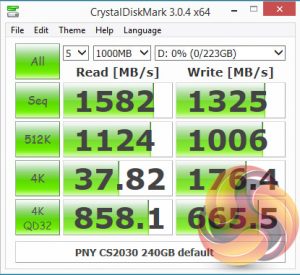
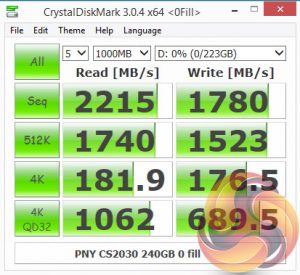
Although PNY's CS2030 is some way behind the Samsung SSD960 PRO when it comes to read performance it does have the third best write figure of the current crop of M.2 drives we have tested. The Phison PS5007-E7 controller has a marked preference for highly compressible data, particularly when reading the data as can be seen by the jump in performance when the drive is tested with the highly compressible data test of CrystalDiskMark.
The ATTO Disk Benchmark performance measurement tool is compatible with Microsoft Windows. Measure your storage systems performance with various transfer sizes and test lengths for reads and writes. Several options are available to customize your performance measurement including queue depth, overlapped I/O and even a comparison mode with the option to run continuously.
Use ATTO Disk Benchmark to test any manufacturers RAID controllers, storage controllers, host adapters, hard drives and SSD drives and notice that ATTO products will consistently provide the highest level of performance to your storage.
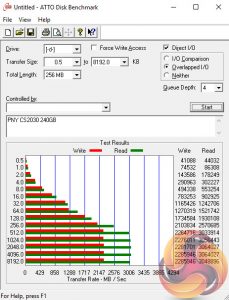
The official Sequential read/write figures for the drive are up to 2,750MB/s and 1,500MB/s respectively which going on the figures got from the review sample drive under the ATTO benchmark seem very conservative, considering we managed to get a read score of 3,064MB/s and 2,281MB/s for writes.
AS SSD is a great free tool designed just for benching Solid State Drives. It performs an array of sequential read and write tests, as well as random read and write tests with sequential access times over a portion of the drive. AS SSD includes a sub suite of benchmarks with various file pattern algorithms but this is difficult in trying to judge accurate performance figures.
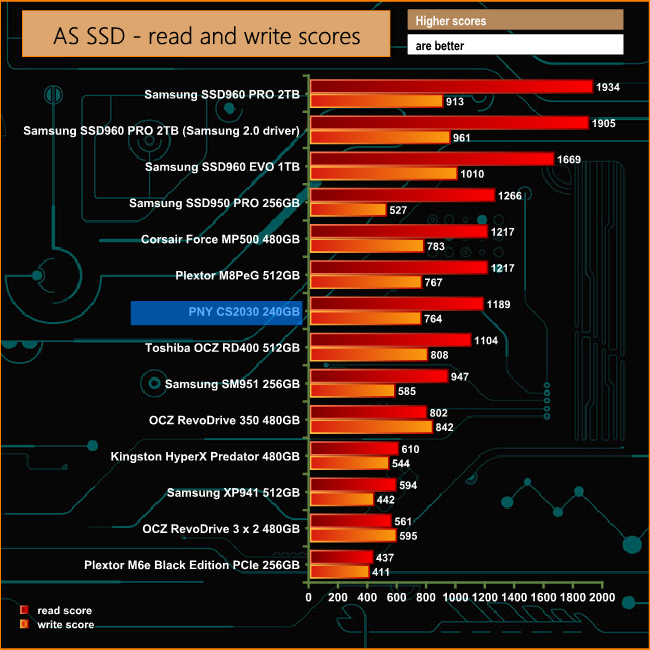
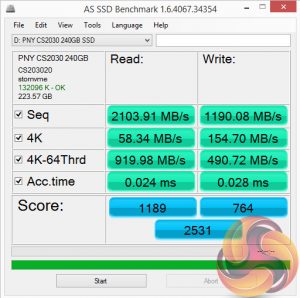
Under the more stringent AS SSD benchmark, those stunning read/write figures we saw in the ATTO benchmark drop to below the official numbers. The drive performs very well at deep queue depths as can be seen from the 4K-64Thrd results.
IOMeter is another open source synthetic benchmarking tool which is able to simulate the various loads placed on hard drive and solid state drive technology.
We test with both random read and write 4k tests, as shown above. There are many ways to measure the IOPS performance of a Solid State Drive, so our results will sometimes differ from manufacturer’s quoted ratings. We do test all drives in exactly the same way, so the results are directly comparable.
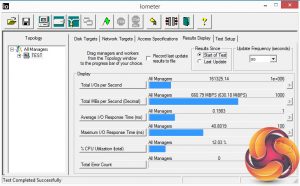
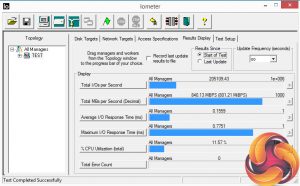
PNY's official 4K random read/write figures for the drive are 201,000 IOPS and 215,000 IOPS respectively. Under our IOMeter test we managed to get a bit more read performance out of the drive at 205,109 IOPS but at 161,325 IOPS the writes fell some way short of the official maximum figure.
Futuremark’s PCMark 8 is a very good all round system benchmark but it’s Storage Consistency Test takes it to whole new level when testing SSD drives. It runs through four phases; Preconditioning, Degradation, Steady State, Recovery and finally Clean Up. During the Degradation, Steady State and Recovery phases it runs performance tests using the 10 software programs that form the backbone of PCMark 8; Adobe After Effects, Illustrator, InDesign, Photoshop Heavy and Photoshop Light, Microsoft Excel, PowerPoint, Word, Battlefield 3 and World of Warcraft. With some 18 phases of testing, this test can take many hours to run.
Preconditioning
The drive is written sequentially through up to the reported capacity with random data, write size of 256 × 512 = 131,072 bytes. This is done twice.
Degradation
Run writes of random size between 8 × 512 and 2048 × 512 bytes on random offsets for 10 minutes. It then runs a performance test. These two actions are then repeated 8 times and on each pass the duration of random writes is increased by 5 minutes.
Steady State
Run writes of random size between 8 × 512 and 2048 × 512 bytes on random offsets for final duration achieved in degradation phase. A performance test is then run. These actions are then re-run five times.
Recovery
The drive is idled for 5 minutes. Then a performance test is run. These actions are then repeated five times.
Clean Up
The drive is written through sequentially up to the reported capacity with zero data, write size of 256 × 512 = 131,072 bytes.
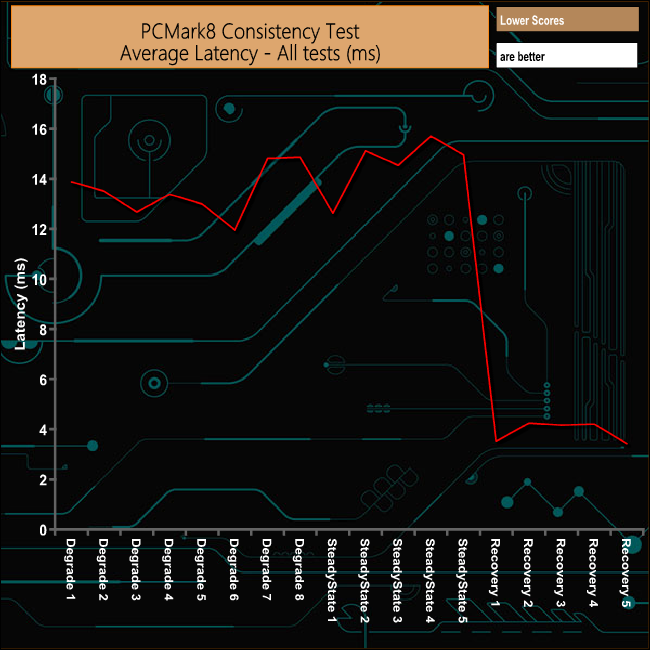
The CS2030 is pretty consistent during the degrade and steady state parts of the benchmark in terms of bandwidth although it's a bit more erratic when it comes to latency. It recovers from the ordeal both in terms of bandwidth and latency extremely well.
PCMark 8’s Consistency test provides a huge amount of performance data, so here we’ve looked a little closer at how the CS2030 performs in each of the benchmarks test suites.
Adobe Creative Cloud
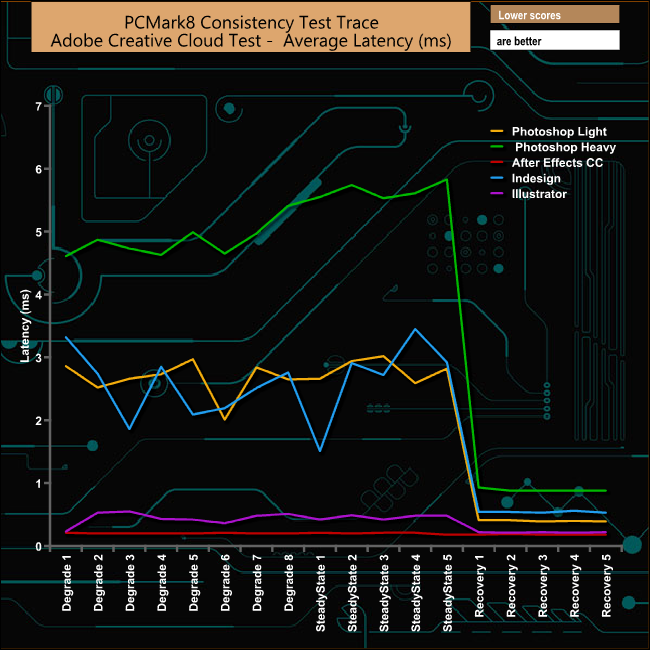
PCMark8’s Photoshop Heavy test is one trace that really does push any drive really hard. The CS2030 starts the Degradation cycle at 115MB/s dropping to 95MB/s at its lowest through the Steady State tests before recovering very well at 516MB/s
Microsoft Office
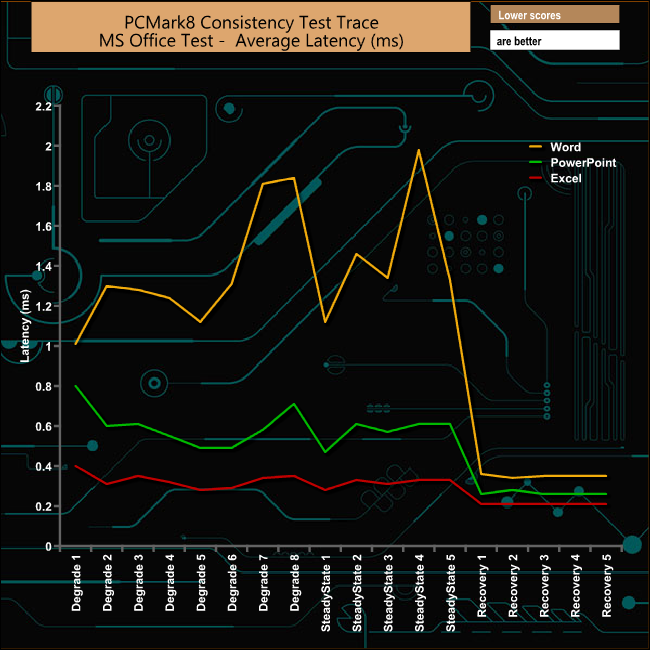
In the Microsoft Office suite, it’s the Word tests that stress’s the drive the most. Once again the drive shows superb recovery from the Degrade and Steady State tests.
Casual Gaming
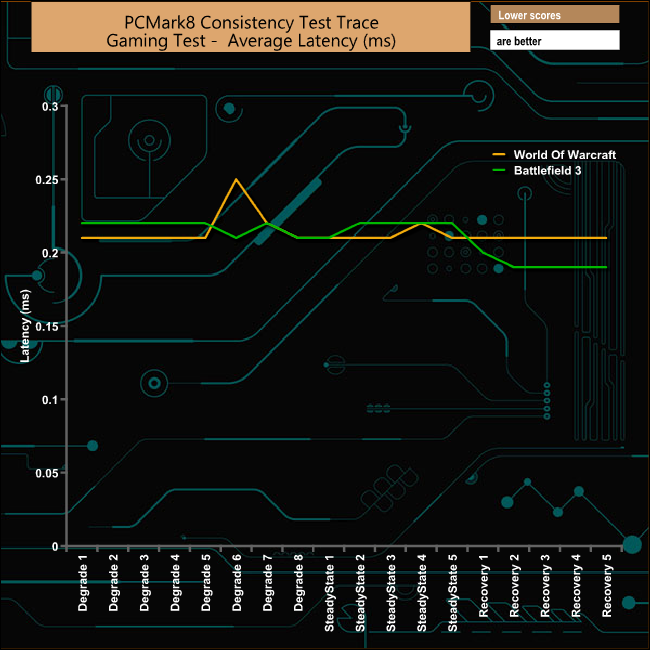
Throughout the Casual Gaming test the CS2030 remains pretty consistent, the drive recovering particularly well from the test runs of Battlefield 3.
Just like the Consistency test, PCMark 8's standard Storage test also saves a large amount of performance data. The default test runs through the test suite of 10 applications three times. Here we show the total bandwidth performance for each of the individual test suites for the third and final benchmark run.
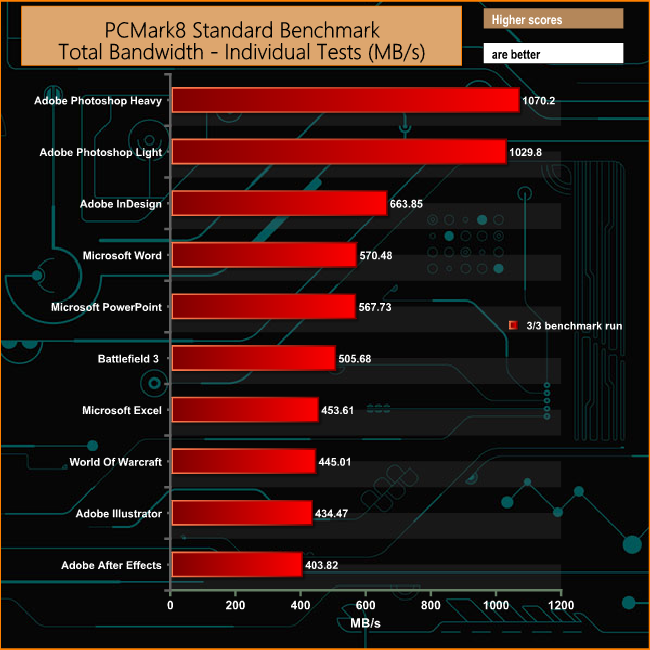
The CS2030 shows solid performance throughout the third and final pass of the benchmark suite for the standard PCMark8 Storage test. It deals particularly well with the heavy demands of both Adobe Photoshop tests.
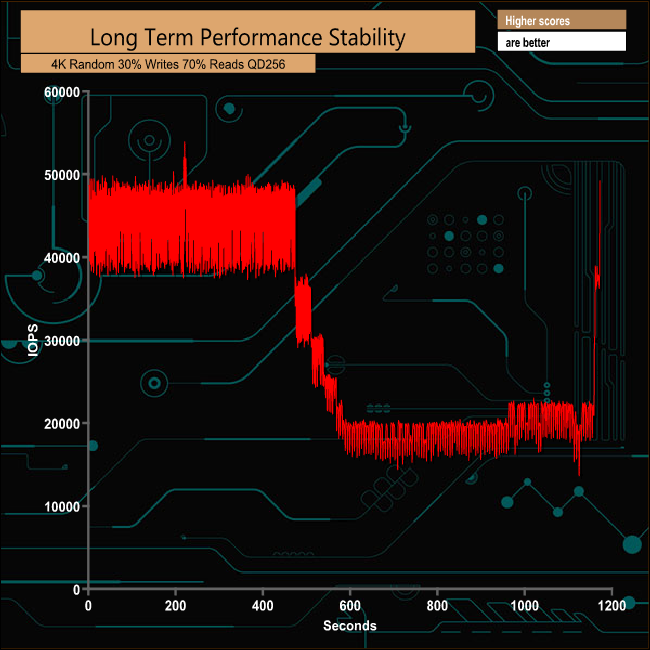
For the long term performance stability test, we set the drive up to run a 20-minute 4K random test with a 30% write, 70% read split, at a Queue Depth of 256 over the entire disk. PNY's 240GB CS2030 averaged 30,629 IOPS for the test with a performance stability of 50.57%
To test real life performance of a drive we use a mix of folder/file types and by using the FastCopy utility (which gives a time as well as MB/s result) we record the performance of drive reading from & writing to a 256GB Samsung SSD850 PRO.
60GB Steam folder – 29,521 files.
50GB File folder – 28,523 files.
12GB Movie folder – 24 files (mix of Blu-ray and 4K files).
10GB Photo folder – 621 files (mix of .png, raw and .jpeg images).
10GB Audio folder – 1,483 files (mix of mp3 and .flac files).
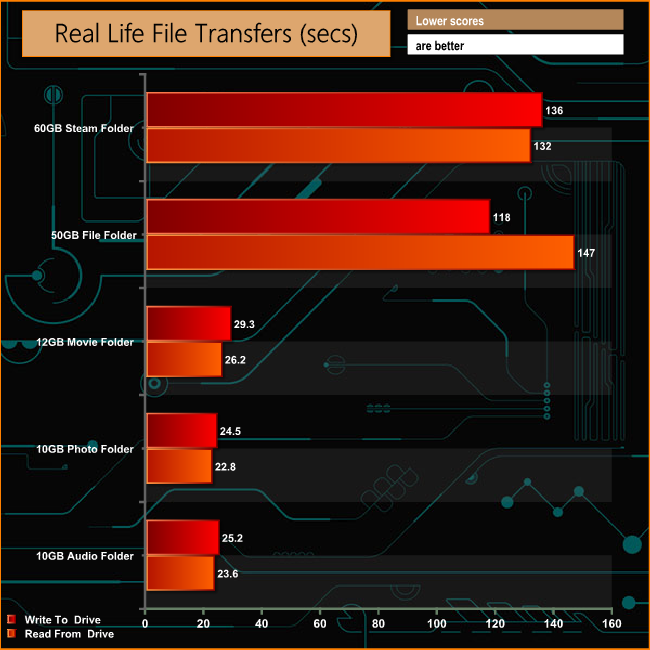
As you might expect from a PCIe SSD, transferring files to and from it poses no problems at all. As an example, it takes just under two minutes to copy the 50GB file folder to the drive and a mere 2m 45 seconds to copy it back.
As significant product launches go, PNY's launch of the CS2030, the company's first consumer PCIe NVMe M.2 drive was discreet to say the least. The first we knew of it was when it suddenly appeared on PNY's US website!
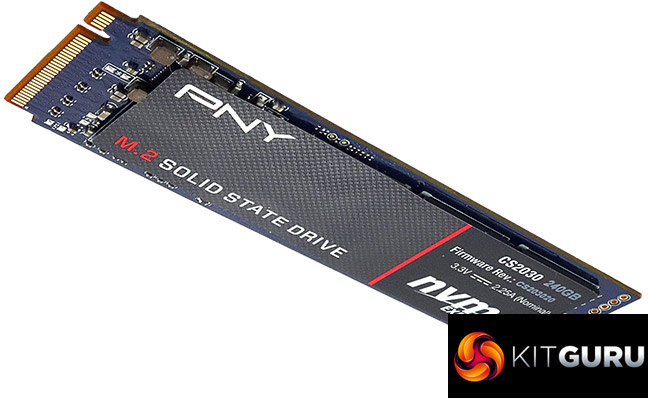
As the first NVMe PCIe Gen 3.0 x4 drive out of the box for PNY it's a very good effort with very strong all-round performance. The sequential performance is excellent, with quoted read/write figures of 2,750MB/s and 1,500MB/s respectively which as it turned out seem to be pretty conservative. When it was tested with the ATTO benchmark we managed to get a read figure of 3,064MB/s with writes coming in at an equally impressive 2,281MB/s.
This makes it the fastest drive we've tested to date in terms of Sequential read performance and it's very nearly the fastest write performance we've seen too, beating the mighty Samsung 960 PRO all ends up.
However, it's a different picture when it comes to the more stringent benchmarks like AS SSD and CrystalDiskMark where the performance drops off below both versions of Samsung's SSD960 drive, the PRO and EVO. But give the Phison PS5007-E7 controller highly compressible data to deal with (the CrystalDiskMark highly compressible data test) and the Sequential read/write performance jumps back up to better than the official figure. Moving from 1,325MB/s to 1,780MB/s write speeds, while reads shoot up from 1,581MB/s to 2,215MB/s.
When it comes to random 4K performance, its a bit of a mixed bag from the test results. Using the IOMeter benchmark, the review drive produced an IOPS score of 205,109 IOPS for reads, some 4,000 IOPS better than the official figure of up to 201,000 IOPS. Writes on the other hand (at 161,325) fell some way short of the quoted maximum of 215,000 IOPS.
The specification sheet for the drive makes no mention of any sort of hardware encryption but it is part of the controllers feature set, but as the CS2030 is marketed as a consumer drive, it's not that surprising that it's not part of the firmware.
We found the 240GB PNY CS2030 for sale for £139.07 (inc VAT) on LambdaTek HERE
Discuss on our Facebook page, over HERE.
Pros
- Overall performance.
- Pricing.
Cons
- Limited capacities.
- 3-year warranty seems a bit mean.
Kitguru says: PNY's latest drive gives the company a seat at the top table of performance SSD's and they have given it a fighting chance with strong competitive pricing.
 KitGuru KitGuru.net – Tech News | Hardware News | Hardware Reviews | IOS | Mobile | Gaming | Graphics Cards
KitGuru KitGuru.net – Tech News | Hardware News | Hardware Reviews | IOS | Mobile | Gaming | Graphics Cards


